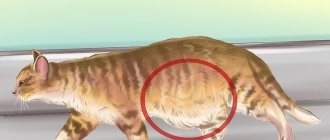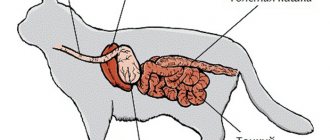Let's look at the topic of cat memory. The most common case that comes to mind is that cats remember their names and respond to them. And how many amazing cases are there in the world when a domestic cat returned home while being hundreds of kilometers away? What is this? Memory or instinct?
Many people feel that animals, even those that have been domesticated, cannot remember what happens to them or learn from such situations. But when you have a pet, your experience with it proves the opposite.
Cat brain structure
The structure of a cat's brain is similar to a human's. It also consists of three lobes - temporal, parietal and occipital, gray and white matter. The parameters are also similar - the neural connection provides five standard responses. Although this organ is at least two times smaller in size.
The weight of a cat's brain is about 1% of its body weight, in a dog - 1.2, in a person - 2, which in no way indicates a similar comparison of the level of intelligence.
The cerebral cortex and the number of neurons are responsible for higher brain activity. A person has 10 billion, a cat has 300 million, and a dog has 160.
Each neural impulse involves specific areas of the brain that store their information.
This concludes the studied area. Scientists can only guess how a cat's memory works.
Features of cat intelligence
It is worth talking separately about other intellectual characteristics of the cat.
- They are able to follow people’s verbal instructions, for example, to approach their call or, on the contrary, to run away when given the command “scurry.”
- They can recognize the mood of the owner.
- Each owner can notice that the pet even has a certain washing procedure, which he always adheres to.
- They easily get used to the daily routine, they know when it is time to play with their beloved owner, eat, sleep or walk.
So, what kind of memory do cats have? As it turned out, in general it ranges from 16 hours. But its volume is still unknown. These are unique creatures that remember only the information that they need for a full-fledged life and filter out all unnecessary details.
Long-term and short-term memory
A well-known experiment conducted by neurospecialist researchers is very indicative.
Yuri Kuklachev with his cat
The animals were shown tasty food and hidden. The cat retained the memory of this factor for 16 hours, and the dog for only 5. This suggested that cats have good short-term memory, at least much better than dogs. Apparently, the cat remembers certain events or people selectively, but can store these memories for a very long time.
It has been established that the most vivid memories are formed in kittens between 2 and 7 weeks of age. That is why at this time it is recommended to persistently socialize them, accustom them to hands, a name, a litter box, a scratching post, and a harness. But the way a cat forms the information that it needs to store is most likely different from that of a human.
The animal somehow evaluates its significance and “puts into a cell” only what it considers important. She will remember the person who was kind to her, but the indifferent “smell” will immediately be erased from her memory.
But negative events can also be stored in the pet’s memory for a very long time. Resentment or physical pain can make a certain person his worst enemy for a very long time, if not forever.
Cats also quickly remember where delicious food is stored and can jump out of a sweet dream and run to the kitchen at the sound of the refrigerator door opening.
At the same time, scientists have not been able to find out how much information a cat’s brain can store. It is generally accepted that the animal somehow processes information, discarding everything “unnecessary”, and retains only facts and events that are important to it. Moreover, it also remembers this only when it considers it necessary or when it encounters it at the next moment of its life.
The human brain stores a large amount of information and accesses it at any time at will. Cats, apparently, do not have such an ability, just as they do not have regrets, dreams, or memories.
How much information does a cat have in his head?
Scientists wondered how much information a cat's memory can hold. But this could not be established for certain. The line between memorization and instincts is not clear. Despite the fact that in general the memory capacity of cats is less than that of humans, they can retain a lot of information. Having thrown away everything unnecessary and leaving the main thing, they store all the knowledge they need for life.
Interesting information was published by Behavioral Processes. It has been reported that four-legged pets have episodic memory, contrary to the belief that only humans have it. What opportunities does this give the cat? It turned out that the animal is able to remember past events if it encounters them again.
This was discovered during experiments by Japanese scientists with bowls of food. The animals remembered which ones contained edible food and which ones contained inedible objects, and subsequently, the first thing they did was explore those containers from which they managed to eat the previous time. Several different tests were carried out on dozens of animals, and each of them confirmed the cat’s ability to remember the circumstances in which it found itself in a previous situation. It became clear that cats not only remember where food is, but also what to explore first to find food.
An orientation experiment was carried out by scientists from Germany. First, they gathered a group of cats from one city, took them some distance from their home and checked whether the pets could return home. All animals coped successfully. Then the task became more complicated. The cats were launched into a large labyrinth, covered from above. The building had 24 exits to different directions of the world. 98% of animals chose the exit that was located in the direction of their home.
The capabilities of cats are much wider than one might imagine. They use memory, instincts, and the ability to navigate, which sometimes leads to surprising situations.
Mr. Cat Recommends: Cats' Learning Ability
But cats also have genetic memory. It is guided by it that animals swim, hunt, give birth and feed their offspring. And after the kittens become independent, the female seems to forget about her purpose. Until the next birth and the next offspring.
At the same time, pets perfectly remember the daily routine of the household. They know exactly who will come and what time. And they wait for their beloved owner, sitting on the window or near the front door. The same internal mechanism causes cats to go to the bowl and ask for food at the same time.
It can be assumed that, as in human life, observation and learning play an important role in cats. After all, it is from the mother that kittens learn the skills of using a litter box, eating solid food, and the ability to take care of themselves.
It has been noted that if you persistently work with cats, especially from an early age, they can easily be taught certain skills and abilities. Most likely, these pets are much smarter than is commonly believed. And if they don’t know something, it’s not because they’re unable to learn something new, but precisely because they don’t want to comprehend it.
If the short-term memory of a cat was assessed in comparison with a dog, then the visual memory was compared with monkeys. And they found out that it is no worse than that of primates.
Cats have a memory for people
Many owners are concerned about whether cats left in the care of children or relatives remember them. It all depends on your importance. If you showed little participation in upbringing and were extremely restrained in your emotions, then there is a high probability that your existence will be quickly forgotten.
Only those who were very kind or, conversely, showed aggression and caused offense, remain in the memories for a long time. Animals remember such people all their lives. For this reason, cats are often afraid of anyone who wears white coats, associating them with doctors.
Memory and aging
As people age, their cognitive abilities also decline. Memory loses its sharpness, some events do not want to be remembered, some, on the contrary, come to the fore.
The same thing happens with cats. Therefore, elderly pets must be treated very carefully. And don’t scold them if they suddenly forget where the litter tray is.
We especially need to take care of walking individuals. Seniors can easily become lost and lost, disoriented in space.
Thus, a cat's memory is very similar to a human's. Its most acute active period occurs in young years, and with age it becomes dull.
How does a cat remember?
A cat's memory is selective. The animal remembers what it needs. For example, a mother cat, while licking her kittens, remembers very well how she did it the last time. But when they grow up and begin to take care of themselves, the mother forgets about these skills.
Cats have what is called episodic memory.
In most cases, cats remember through observation. From birth, they look up to their mother and learn courtship skills. They also learn to hunt and solve life's puzzles. Animals cannot specifically remember or fantasize about something. Only when faced with a certain situation does information emerge from the brain.
The biggest peak of development is the first three years.
Interesting Facts
The memory of cats can be called a unique and completely unstudied phenomenon, if we list at least some of the cases of pets returning home.
A family that traveled from the Rostov region to Lugansk to visit relatives lost their cat Barsik, who was afraid of the dog in the new house.
A little more than a month passed, and the fugitive returned to his home, having covered a distance of more than 200 km.
A similar story happened in 1963 with the French cat Mumusu. They also took him with them to stay and lost him. The pet returned home almost a year later, having traveled 750 km.
The English cat Mack, although he did not find his home on his own, did not forget his owner even after 6 years of his ordeal. He disappeared while traveling through the canals. Volunteers identified the pet after a long time using its chip and returned it to its home. Mac happily rushed to his beloved owner.
But the most unique case happened with the cat Semyon, to whom a monument was erected even in 2013 in Murmansk. He walked from Moscow to his hometown for 6 years, covering more than 2 thousand km. And he arrived safe and sound, but very thin. And even though bronze Semyon does not look like a slender Siamese, it is not even a monument to a pet, but to his love, devotion and memory.
Out of sight, out of mind?
But it also happens differently. It seems that the cat was kindly treated by the person and even felt sad for him at first, but years later he pretends that he doesn’t know him. “Pulking!” - people think, attributing human feelings to a cat.
In fact, over the past time, another owner has taken on the role of breadwinner, drinker and protector, and the animal’s memory has erased unnecessary information about what happened before. The returning cat will take him back to his place - and after a while he will get used to him again.
Let’s make a reservation once again - these rules apply to most cats, but each case is individual. In general, when getting an animal, you need to understand the full extent of the responsibility that you take on, and try to avoid situations that can result in enormous stress for both of you. As they say, don’t part with your loved ones!
Svetlana Mosolova
Does memory help learning?
Observation and experience allow cats to learn everything they need to live a comfortable life. With the help of memory, they choose what will be useful and what allows them to react in the most appropriate way the next time the same situation occurs. Memory works both at home and in nature, since from childhood they watch their mother to find out everything they need.
This system allows the cat to remain safe while at the same time identifying familiar people and remembering all the positive things associated with them; such as delicious food, affection, and hours of play! What a cat learns is directly related to the benefits they can derive from that learning.
We suggest you read: Why does a cat have white worms in her stool? What to do?
If they find that it doesn't suit them, it will likely be resolved by their short-term memory. This is why it is so difficult in most homes to prevent them from scratching in certain areas. Although you can train your pet to use a scratching post, it is not always possible to train them.
How does a cat's memory work?
Scientists report that a cat's memory is structured almost like a human's, that is, it can be long-term and short-term. Long-term memory is responsible for remembering long-ago events, such as when a cat was a kitten. Short-term memory allows a cat to remember complex things for a period of time, such as several minutes or hours. There is no doubt about the existence of these types of cat memory, as this has been confirmed by experiments.











